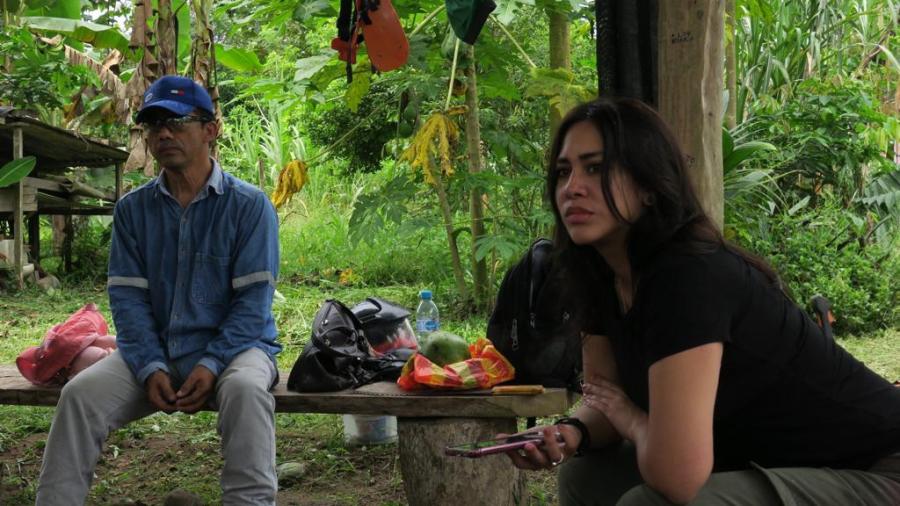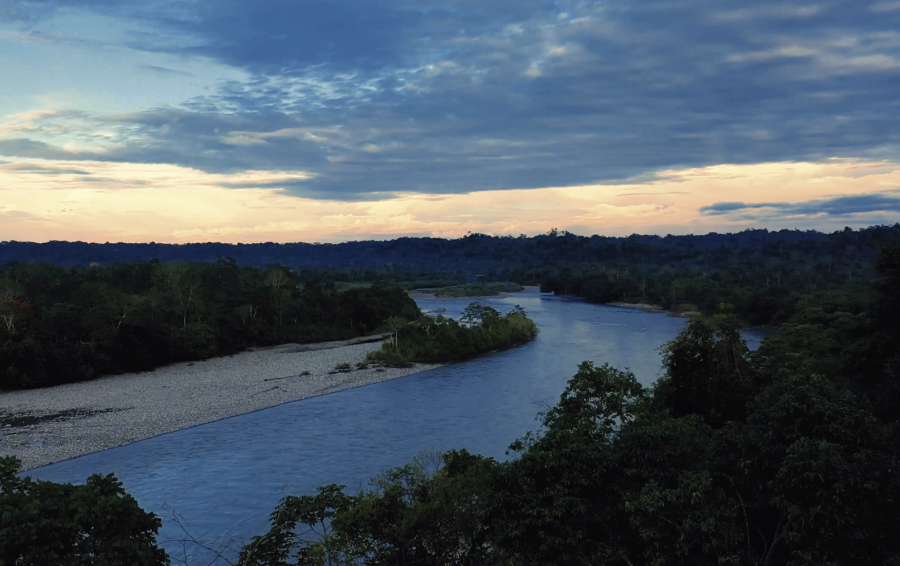Over the past 10 years, more than half of Cultural Survival's funds have supported field projects among indigenous peoples and ethnic minorities in the Third World. The final Cultural Survival Quarterly of each year includes a brief description of our approach to projects and project selection as well as an overview of projects funded during the year.
Cultural Survival's Approach to Projects
Cultural Survival's complementary program of field projects and research evolved from an understanding that people in small societies often become victims during periods of rapid change by being excluded from decision making, not through any inability or unwillingness to change. Genocide or other gross human rights violations often occur after a long process of social erosion and economic marginalization has weakened a group's ability to defend itself. Terms such as assimilation and integration often serve to mask such processes, thereby making more palatable the destruction of the social fabric that binds a group.
Cultural Survival defines the term culture as a set of social mechanisms that gives a society its identity and allows it to comprehend its place in the -world and adapt to changing circumstances. This definition does not imply the preservation of some romantic status quo, but rather supports those mechanisms that permit a group to successfully adapt to change. Cultural Survival takes the position that societies do change and that it is not for outsiders to determine whether indigenous people are being "true to themselves." The organization responds to the needs expressed by native peoples themselves, not to some outsider's idealized image of an appropriate life. These ideas are consistent with the aspirations and demands of native peoples the world over.
Field projects generally assist groups that are undergoing radical social change and have reached critical crossroads in their social and economic evolution. Projects are selected to maximize such groups' control over economic and social variables so that they are able to make key decisions regarding the future of their communities. Problems addressed by projects include land rights, natural resource management, legal services, economic development, and cultural studies and promotion.
Project Selection
Rather than design projects, Cultural Survival generally responds to requests for assistance from either indigenous communities or their regional organizations or support groups. Unfortunately, our budget permits us to fund only a few of the requests received. To increase the impact of our limited funds, we select projects that (1) address problems faced by many small societies and (2) allow for extensive documentation and analysis.
By addressing common problems we can respond to a few groups' urgent needs and, at the same time, generate case studies useful in developing methodology and theory for future work elsewhere. Cultural Survival has also provided emergency assistance, such as medical supplies and travel funds to support research during periods of extreme crisis.
Cultural Survival's primary goal is to help indigenous peoples retain control over decisions affecting their lives and future. Our support often includes funding their representative organizations, assisting them in obtaining secure land tenure, and providing technical assistance and training in resource management and economic development. Support provided by Cultural Survival-particularly to regional Indian organizations (ethnic federations) - often does not fund entire or discrete "projects." Cultural Survival's contributions generally support a single segment of a group's overall program. In each case, however. Cultural Survival's concern is with the entire organization, its program, and the projects that program creates.
Current and Future Projects
The overall philosophy of Cultural Survival's approach to projects will remain unchanged. The list of projects supported in 1989 indicates the breadth of our activities; our commitment to such a range of projects will continue. However, in response to critical changes now facing indigenous people, Cultural Survival has focused on the following related activities:
Supporting Representative Indigenous Ethnic Federations
Ethnic federations are an increasingly effective voice for the world's indigenous peoples. During the past two decades, such organizations have formed in every country in Latin America. In the past, Indians have been excluded from development plans that affected them; representative Indian federations can now challenge this marginalization of indigenous peoples in the national and international sphere. Ethnic federations were initially formed at the grassroots level to address local concerns. As Indian leaders discovered that the dispersed indigenous communities often face the same problems and challenges, local organizations united to create ethnic and pan-ethnic federations.
Such mobilization has been - and for many remains - an essential first step toward empowerment. Cultural Survival continues to support such work.
However, to maximize their strength, ethnic federations must both protect Indian rights and resources and provide opportunities for economic improvement in indigenous communities. Within this context, many ethnic federations now seek to design and implement programs of rational resource management.
Developing Sustainable Resource Management Programs
Indigenous people are fully aware that the quality of their existence - present and future - is linked to controlling and managing their lands. However, de facto control is often won through demonstrated use of natural resources. Lands not under active cultivation are easy targets for legal or extralegal expropriation. Lack of land tenure security has thus encouraged ecologically destructive competition among indigenous peoples, colonists, agribusiness, an economic interests.
Sustainable resource management programs benefit indigenous communities in numerous ways: they can strengthen land tenure status by demonstrating gainful use of the land, they can provide ongoing economic opportunities to the communities, and they can offer a way to preserve and sustain lands.
Cultural Survival's work with indigenous federations in the area of resource management demonstrates the potential convergence of interests among such groups and national governments and environmentalists - a convergence that in the past has proven elusive. Cultural Survival aims to strengthen the federations and thus promote more balanced interaction among indigenous peoples, national governments, and other organizations.
Developing a Marketing Network
Cultural Survival is currently establishing a marketing network for sustainably produced tropical forest products. This program is an extension of our work in natural resource management and economic development; by providing markets for products produced in a sustainable manner by indigenous peoples, we will encourage nondestructive use of forest resources, increase economic opportunities for long-term forest residents, and support the growth of indigenous peoples' cooperatives. In addition, we seek both to educate consumers in the United States and abroad about indigenous tropical forest residents through informational packaging on goods sold through this program and to generate funds for projects through the sale of these goods.
Cultural Survival shares its knowledge of indigenous peoples' efforts to solve their problems - gained from the projects we support and the research we conduct - with native peoples and communities, foundations, governmental agencies, and the general public. This issue of the quarterly contains a listing of projects supported during 1989 along with the issue of the quarterly in which they were most thoroughly described. Anyone wishing additional information on a particular project can consult past issues of the quarterly or contact Cultural Survival with questions.
Projects Supported in 1989
Australia
Black Women's Education Fund - Scholarship fund for advanced education of Aboriginal and Torres Strait women.
Brazil
Union of Indigenous Nations (UNI), Education Project - Providing formal training for Indians in the fields of natural resource management and law.
Nucleus for Indigenous Rights (NDI) - Bringing test cases to Brazilian courts to establish precedents for matters relating to Indian rights.
Kayapó Fund-Support to Altamira Congress to protest hydroelectric dams on the Xingú River. Assists development of production and markets for nontimber forest products in Aukre.
Ecumenical Center for Documentation and Information (CEDI)-Core and technical support for Indian program. Assistance to help CEDI monitor and report on situation of Indians in Brazil.
Amazonian Institute for Ethnobotany, Belém - Core support for the institute to identify and source Amazonian products that might have an international market.
Yanomami Legal Defense Fund - Support for Yanomami through sending a team of Indians and Indianists to Yanomami territory to explain significance and impact of recent Supreme Court ruling on Yanomami lands.
Colombia
Regional Indian Council of Cauca (CRIC) - Reforestation and land reclamation program undertaken by the regional indigenous council. Creation of experimental agricultural stations and nurseries in the environmentally degraded Cauca region.
Center of Indigenous Cooperation (CECOIN) - Land reclamation and agroforestry program for deforested tropical lowlands, home to the Emberá Katio Indians.
Puerto Rastrojo - Resource management project in the Caqueta River region that involves local Indians extensively in both planning and implementation.
Ecuador
Awa Reserve and Resource Management - Establishment of Binational (Ecuador and Colombia) Indian/Forest Reserve, elaboration of resource management program.
Salasaca Legal Defense Fund - Management and monitoring of legal defense fund for a Salasacan Indian whose legal case is being tried in an environment of racial tension.
Project Letimaren - Three-part project involving land surveying and development and implementation of natural resource management plans in the Napo valley. The project also supports the creation of an international network of indigenous technical teams trained in natural resource management.
Honduras
Mowpawi Land Legalization - Land titling and resource management planning in ancestral lands of Miskito, Garífuna, Tawahka, and Pech Indians in the Honduran Mosquitia.
Mexico
Sná Jolobil - Maya weavers' cooperative that helps weavers obtain fair prices and market their craft. The co-op is now entering the international craft market.
Sná Jtz'ibajom-Maya writers' cooperative that seeks to maintain and revitalize Mayan culture in the state of Chiapas through transcription of Mayan tales and puppet theater performed in Tzotzil and Tzeltal.
Middle East
The Kurdish Program - Extensive research and publicity on the Kurdish situation. Program coordinator has compiled the most comprehensive collection of materials on the Kurds in the United States to date.
Namibia
!Kung San Development Foundation - Resettlement and cattle production project to assist the Ju/Wasi in returning to their traditional lands. Thirteen communities have been settled since the project began in October 1986.
Pakistan
Afghan Refugee Weavers Project - Reviving traditional methods of Afghan rug production within refugee camps in Pakistan and creating a market for rugs produced. Natural dyeing processes have been recovered and the first shipment of rugs has arrived in Cambridge, Massachusetts.
Panama
First Inter-American Indigenous Conference on Conservation of Natural Resources and the Environment - Providing support for this important conference organized by the Kuna, acknowledged leaders in the area of natural resource management.
Sarawak
The Penan Project - Provides medical assistance and legal support to the Penan to help restore their customary land rights in the face of logging threats.
Tibet
The Tibet Project - Preservation of Tibetan culture through support to Tibetan scholars and scholarship on subject of modern Tibetan politics.
Venezuela
Warao Land Demarcation and Resource Management - Working with the Union of Warao Indigenous Communities to obtain land title and undertake resource management planning in the Orinoco River Delta.
Article copyright Cultural Survival, Inc.



